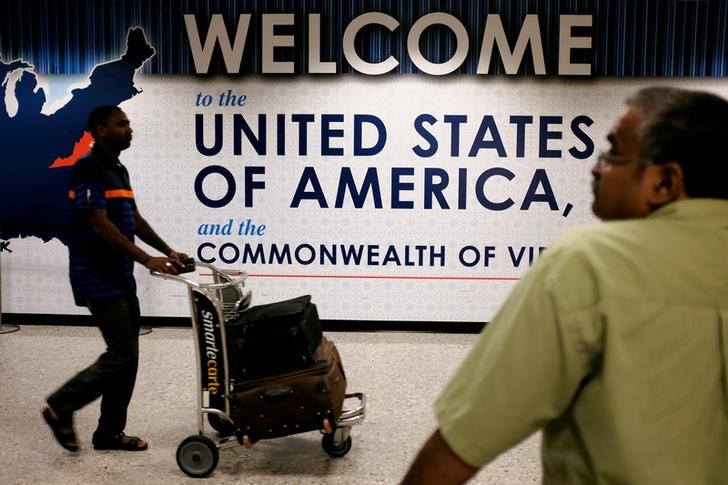By Richard Cowan
WASHINGTON (Reuters) - A bipartisan group of U.S. senators on Thursday reached a tentative agreement on legislation to protect young "Dreamer" immigrants from deportation, along with other immigration policy changes, and is attempting to build support for the deal in Congress.
The senators, three Democrats and three Republicans, "have reached an agreement in principle that addresses border security, the diversity visa lottery, chain migration/family reunification and the Dream Act," they wrote in a statement. "We are now working to build support for that deal in Congress."
Details of the plan were not immediately available and the proposal promptly met some resistance.
The six senators are Democrats Dick Durbin, Michael Bennet and Robert Menendez and Republicans Lindsey Graham, Jeff Flake and Cory Gardner.
The proposal was presented to the White House for President Donald Trump's consideration before seeking passage in the Senate and House of Representatives.
A senior Republican congressional aide, who did not want to be named, noted that the White House was briefed on the senators' proposal and said, "It's clear it's a non-starter."
At that meeting, Trump questioned why the United States would want to have immigrants from Haiti and African nations, referring to some as "shithole countries," according to two sources familiar with the comments.
The aide said that instead, the White House is working with a different group of lawmakers - the four No. 2 House and Senate Republican and Democratic leaders who began meeting on Wednesday. It includes Durbin.
At a White House meeting two days ago with a large group of lawmakers, Trump said he would accept whatever legislation Congress presents him. But conservatives have been pressing him to stand behind their efforts to curtail new immigration.
And in an interview with the Wall Street Journal, Trump backed away from remarks he made on Tuesday in which he said he could eventually consider legislation providing a pathway to citizenship for the 11 million undocumented immigrants estimated to be in the United States.
"I'm not talking amnesty at all," Trump was quoted on Thursday by the Wall Street Journal.
The Senate group has been working for months in hopes of crafting legislation that would prevent the around 700,000 illegal immigrants brought to the United States as children - known as Dreamers - from being subject to deportation after Trump ended a program providing them with temporary legal status and work permits.
Without action by Congress, the Dreamers, who are largely from Mexico and Central American countries, could be subject to deportation beginning in early March.
Senate negotiators were trying to get legislation assembled by next week so it could possibly be attached to a spending bill that Congress will have to pass to avoid government shutdowns after Jan. 19.
A thicket of controversial provisions has been under discussion, according to lawmakers, congressional aides and immigration experts outside of government.
For example, Democratic Representative Henry Cuellar said in an interview on Wednesday that the legislation should include protections from deportation for parents of Dreamers.
Many conservatives would balk at providing "amnesty" to parents who brought their families across the border illegally. One possible compromise, according to congressional aides, could be to let these parents receive temporary legal status that could be renewed every three years. But unlike their children, the parents would never be placed on a pathway to citizenship.
That could anger Dreamers and Hispanic groups who have long railed against creating a "second-class" category of people in the United States.
Also under consideration, according to congressional aides, is a plan to restructure the "diversity" immigrant visa program so that it no longer operates via a lottery system. The program, which aims to provide visas to people from countries with low rates of immigration to United States, currently distributes up to 50,000 visas a year.
A related initiative, according to congressional aides, would shore up the Temporary Protection Status program that has been under attack by the Trump administration.
Trump has decided, for example, to end the TPS status granted to about 200,000 people from El Salvador following a devastating earthquake in the Central American country. TPS grants legal status to immigrants, allowing them to work.
A border security provision is likely to include more money for a mix of additional physical barriers and technology along the U.S. border with Mexico but probably not a border wall on the scale that Trump campaigned on in 2016.

For years, Congress has weighed clamping down on what conservatives call "chain migration," which opens the door for immediate relatives of legal immigrants to come the United States - often following a protracted wait time. It was not clear whether the senators' deal would somehow target parents or siblings seeking entry.